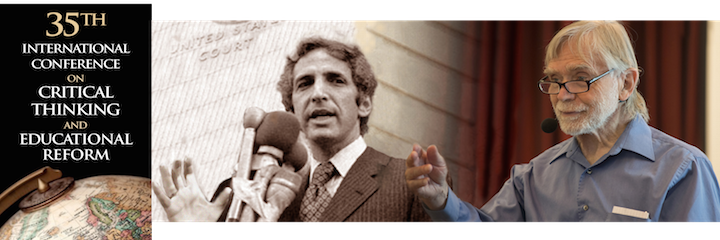| Together, the Center and Foundation for Critical Thinking have hosted critical thinking academies and conferences for 35 years. During that time, we have played a key role in defining and advancing the principles and best practices of fairminded critical thought in education and society. Our annual conference provides a unique opportunity for you to improve your understanding of critical thinking, as well as your ability to more substantively foster it in the classroom and in all aspects of your work and life. The conference begins with three preconference session options . If you have not participated in our conference before, we strongly recommend that you attend our two-day preconference. In all preconference sessions we focus on the foundations of critical thinking that are at the heart of our approach. These foundations are then contextualized throughout the conference. The rest of the conference will consist of focal sessions, concurrent sessions, and roundtable discussions, offered over four days. When you register for the conference, you will choose your preconference sessions, and your focal sessions for days one, two, and four of the main conference. Preconference and Focal sessions are led primarily by Fellows and Scholars of the Foundation for Critical Thinking. On the third day of the conference you will choose from approximately 30 concurrent sessions. (The full concurrent session program will be available at the conference). Many of the sessions will be posted online in advance. Throughout our work we emphasize the importance of fostering a substantive conception of critical thinking. Such a conception not only highlights the qualities of the educated person, but also implies the proper design of the educational process. There are essential minimal conditions for cultivating educated minds. These entail modes of instruction that facilitate development of the standards, abilities, and traits of the educated person. All of the traditional content areas of school may be, but typically are not, taught so as to conduce to those standards, abilities, and traits. For instance, when literature is substantively taught, it is taught as literary thinking. The major goal: to give students practice in thinking analytically and critically about literary texts. As a result, students learn not only how to read novels, plays, short stories, and poems with insight, understanding, and appreciation, but also how to formulate and analyze literary problems, reasoning from information in a literary text to plausible interpretations and judgments of appreciation (which they are able to explain and defend on reasonable grounds). When this is done effectively, students come to see the significance of literature, literary thinking, and imagination both in their own lives and in the life of culture and society. Literature becomes an important way to learn about human nature and the human condition as well as a lifelong source of insight and pleasure. When students are taught using a substantive concept of education as the guide to the design of instruction, they learn to initiate, analyze, and evaluate their own thinking and the thinking of others (within all the content areas they study). Doing so, they come to act more reasonably and effectively in every part of life. They are able to do this because they have acquired intellectual tools and intellectual standards essential to sound reasoning and personal and professional judgment. Self-assessment becomes an integral part of their lives. They are able to master content in diverse disciplines. They become proficient readers, writers, speakers, and listeners. They use their learning to raise the quality of their lives and the lives of others. They become reasonable and fairminded persons capable of empathizing with views with which they disagree and disagreeing with views uncritically accepted by those around them. They are able to use their reasoning skills to contribute to their own emotional life and transform their desires and motivations accordingly. They come to think, feel, and act effectively and with integrity. All conference sessions are designed to converge on basic critical thinking principles and to enrich a core concept of critical thinking with practical teaching and learning strategies. For a richer explanation of core critical thinking concepts, see the Thinker's Guide Library (Click Here).
Focal Session Presenters Include:
Dr. Linda Elder
Dr. Linda Elder is an educational psychologist and a prominent authority on critical thinking. She is President and Senior Fellow of the Foundation for Critical Thinking. Dr. Elder has taught psychology and critical thinking at the college level, and has given presentations to more than 20,000 educators. She has coauthored four books and twenty-four thinker's guides on critical thinking. Concerned with understanding and illuminating the relationship between thinking and affect, and the barriers to critical thinking, Dr. Elder has placed these issues at the center of her thinking and her work.
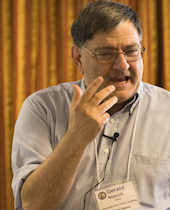 Dr. Gerald Nosich Dr. Gerald Nosich Dr. Gerald Nosich is an authority on critical thinking and Senior Fellow of the Foundation for Critical Thinking; he has given more than 150 national and international workshops on the subject. He has worked with the U.S. Department of Education on a project for the National Assessment of Higher Order Thinking skills, has served as the Assistant Director of the Center for Critical Thinking, and has been featured as a Noted Scholar at the University of British Columbia. He is Professor of Philosophy at Buffalo State College in New York and the author of two books, including Learning to Think Things Through: A Guide to Critical Thinking Across the Curriculum.
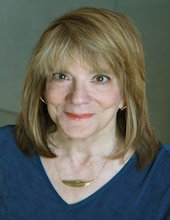 Dr. Elizabeth Loftus Dr. Elizabeth Loftus Elizabeth Loftus is Distinguished Professor at the University of California, Irvine. She holds faculty positions in three departments (Psychology & Social Behavior; Criminology, Law & Society: Cognitive Sciences), and in the School of Law. Since receiving her Ph.D. in Psychology from Stanford University, she has published twenty-two books (including the award winning Eyewitness Testimony) and 500 scientific articles. Loftus's research of the last 30 years has focused on the malleability of human memory. She has been recognized for this research with six honorary doctorates (from universities in the U.S., Norway, the Netherlands, Israel, and Britain), and election to the National Academy of Sciences. She is past president of the Association for Psychological Science. Loftus has been recognized in the Review of General Psychology as one of the 100 most eminent psychologists of the 20th century.
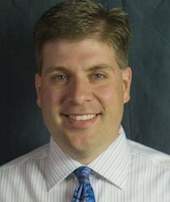 Dr. Paul Bankes Dr. Paul Bankes For more than 10 years, Dr. Bankes has played an important leadership role in fostering the Paulian conception of critical thinking in instruction across his district. As a principal, he led the implementation of this critical thinking approach to achieve state-recognized levels of achievement in three different Title I schools - a high school, a middle school and an elementary school. He helped author the reasoning portion of the Colorado Academic Standards that are based on the Paul-Elder framework. In addition to his administrative experience, Dr. Bankes has taught courses at the college level in critical thinking and served as an elementary teacher.
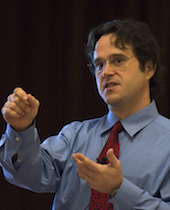 Dr. Brian Barnes Dr. Brian Barnes
Dr. Brian Barnes has taught Critical Thinking courses for seven years at the university level. He has earned grants from Hanover College, the James Randi Education Foundation, and the University of Louisville focused on developing critical thinking in everyday life. He holds a Masters degree in Philosophy and a PhD at the University of Louisville, which fosters the Paulian Approach to critical thinking across the curriculum. Mr. Barnes is a visiting scholar of the Foundation for Critical Thinking.
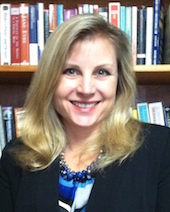 Dr. Amanda Hiner Dr. Amanda Hiner
Dr. Amanda Hiner, Assistant Professor of English at Winthrop University, Rock Hill, SC, has taught graduate- and undergraduate-level courses in critical thinking, academic writing, and literature for over twenty years. She holds a Master's Degree in British and American literature and a Ph.D. in Eighteenth-Century British literature from Washington University. Dr. Hiner serves as coordinator for the Critical Reading, Thinking, and Writing courses at Winthrop University, an institution that integrates the Paulian Framework for critical thinking in substantive ways into both its Writing Program and its General Education Program. Over the last five years, Dr. Hiner has focused on integrating the Paulian Framework for critical thinking into classroom instruction - publishing articles, presenting at conferences, developing curricula and educating faculty in the Paul-Elder approach to Critical Thinking. Dr. Hiner's articles "Critical Thinking in the Literature Classroom, Part II: Dicken's Great Expectations and the Emergent Critical Thinking" were recently published in INQUIRY: Critical Thinking across the Disciplines, and her article "The Viability of the English Major in the Current Economy" ( CEA Forum 2012 ) emphasizes the crucial role of critical thinking in literary studies and English curricula.
|
| Choose one preconference and focal session for each section...
PRECONFERENCE
Saturday and Sunday (July 25 - 26, 2015)
- Bringing Critical Thinking into the Heart of Teaching and Learning… Dr. Linda Elder
- Critical Writing - Teaching Students How to Write a Paper Using the Principles of Critical Thinking… Dr. Gerald Nosich
- Living the Examined Life Through Daily Practice in Critical Thinking: 30 Weeks to Better Thinking and Better Living… Dr. Paul Bankes and Dr. Brian Barnes
DAY ONE FOCAL SESSIONS
Monday (July 27)
- Incorporating Critical Thinking Assessment into the Fabric of Teaching and Learning Every Day… Dr. Linda Elder
- Helping Students Come to Understand Content as a Mode of Thinking … Dr. Gerald Nosich
-
To What Extent do the Common Core Standards Foster Critical Thinking, World Justice, and Freedom of Thought?... Dr. Paul Bankes - Transformative Thinkers throughout History Who Have Cultivated and Advanced the Concept of Freedom of Thought ... Dr. Brian Barnes
(This is an advanced session for returning registrants)
DAY TWO
Tuesday morning (July 28) Bertrand Russell Distinguished
Scholars Lecture & Conversation
Bertrand Russell Scholar:
Dr. Daniel Ellsberg
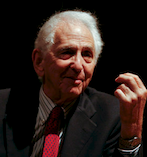
All Conference delegates are encouraged to actively participate in this session. Only those registered may attend.
|
- Roundtable Discussions after lunch
DAY TWO FOCAL SESSIONS
Tuesday afternoon (July 28)
- Employing Socratic Questioning as a Means to Cultivating the Intellect and Freeing the Mind… Dr. Gerald Nosich
- The Inherent Fallibility of Human Memory and Some Core Implications for Teaching and Learning… Dr. Elizabeth Loftus and Dr. Linda Elder
- Helping Students Deal with Bad Habits of Mind that Impede Their Learning and Their Development as Thinkers… Dr. Brian Barnes
- For Administrators: Fostering a Substantive Conception of Critical Thinking Throughout Teaching and Learning… Dr. Paul Bankes
DAY THREE
Wednesday (July 29)
- Concurrent sessions - To be announced a few weeks prior to the conference.
Concurrent sessions are one hour in length. Most sessions are conducted by faculty and administrators who have been working with critical thinking concepts and principles for several years, bringing critical thinking into the individual classroom or across the curriculum.
DAY FOUR
Thursday morning (July 30)
- Teaching Students to Pursue Transformative Concepts within Academic Disciplines… . Dr. Gerald Nosich
- The Philosophy of Richard Paul and Some Core Implications for Teaching and Learning … Dr. Paul Bankes and Dr. Brian Barnes
- Creating Lifelong Critical Thinkers: Integrating the Paulian Critical Thinking Approach Into a General Education Program ... Dr. Amanda Hiner, Winthrop University
- Understanding the Inherent Barriers to Freedom of Thought and the Emancipated Mind…. Dr. Linda Elder
| |
